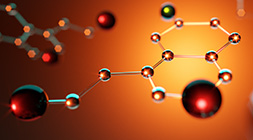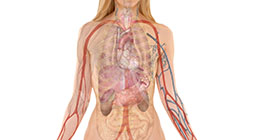
Overview
Type of PCOS
Symptoms
Causes
Prescription
Health Tips
Polycystic ovarian syndrome (PCOS) is a hormone disorder which affects up to 10 percent of women and is the leading cause of infertility (due to eggs not being released). If pregnancy does occur, it often ends with a first trimester miscarriage or is associated with gestational diabetes. Symptoms may vary depending on the type of PCOS.
The most common type of PCOS (insulin resistant type 1) is characterized by high androgen (male hormone) levels, insulin resistance, and many fluid-filled cysts, but some women with PCOS have no cysts present. The release of excess luteinizing hormone by the pituitary gland, as well as excess circulating insulin, increases the production of male hormones that may cause acne, oily skin, and coarse hair growth on the face or chest.
Symptoms often become apparent in puberty when menstruation begins; irregular menstrual periods with copious bleeding may occur, or PCOS can cause a lack of periods altogether.
The condition seems to run in families with 20 percent of mothers and 40 percent of sisters of those with PCOS also demonstrating varying degrees of the syndrome. With the approach of menopause, androgen production declines, and there is a more normal pattern of menstruation. It is very important to treat the root cause of PCOS because the women it strikes are at an increased risk of endometrial cancer, type 2 diabetes, cardiovascular disease, and hypertension.
Types of PCOS
Type 1 (Insulin resistant): High androgens, insulin resistance, irregular ovulation
Type 2 (Non-insulin resistant): High androgens, non-insulin resistant, irregular ovulation
Non-traditional PCOS I: Normal androgen levels, insulin resistance, irregular ovulation
Non-traditional PCOS II: High androgens, insulin resistance, regular ovulation
Idiopathic Hirsutism: High androgen levels, non-insulin resistant, regular ovulation
Symptoms
Type 1 PCOS affects most women with the condition and they will often but not always experience the following symptoms:
- Abnormal or excessive hair growth on face and chest
- Acne and oily skin
- Dark patches of skin
- Enlarged ovaries with multiple cysts
- Heavy, irregular or absent menstrual cycles
- Infertility
- Skin tags
- Thinning hair
- Weight gain
Causes
Although historically considered a gynecological problem, research now shows that PCOS is associated with hyperinsulinemia (production of too much of the hormone insulin) and impaired glucose metabolism. Perhaps not surprisingly, more than 65 percent of women who suffer from PCOS are obese. Since the extra weight seems to be an important contributor, those with PCOS should work toward losing excess weight gradually, using proper nutrition and exercise to address insulin resistance. Doing so will also lessen the risk for diabetes and cardiovascular disease. Addressing insulin resistance is important for lean women with PCOS as well.
Reports indicate that early pubarche (breast budding and pubic hair growth) is linked to ovarian hyperandrogenism and insulin resistance, suggesting another hormonal trigger. Doctors typically try to determine if a tumor is responsible for the production of male hormones. Thyroid and prolactin abnormalities should also be investigated as possible causes of amenorrhea (lack of period).
Some women may experience temporary PCOS which is induced by birth control pill cessation. These women had normal ovulation before or while using the pill, but once discontinuing it they experience irregular or absent periods, high androgens, and are not insulin resistant.
Some research suggests the pill may actually impair proper glycemic regulation. This is problematic since many women are prescribed the pill to help mask the symptoms of PCOS. In addition, the pill may cause deficiencies in nutrients that are needed for proper glucose metabolism.
Prescription for Health
Diet
Carbohydrates – Adopt the simple rule of not eating any white foods – white sugar, white flour, white pasta, white rice, white potatoes, etc. Avoid all processed foods. Processed foods contain sugars, trans-fatty acids and refined carbohydrates which take only a few minutes to cause a rapid increase in blood sugar, and a corresponding release of insulin. A complex or non-refined carbohydrate can take hours to convert to glucose. Grains in their whole form make great breakfast porridges and work well in savoury meals as a rice replacement. The foods below increase the amount of fiber in the diet, which is also important for diabetics.
Include:
- Brown rice
- Buckwheat
- Millet
- Quinoa
- Steel-cut oats or whole oat groats
- Whole grain pastas
Fats – Avoid sources of poor-quality saturated fats such as deep-fried foods (chips, crackers, doughnuts), margarine, poor-quality oils (canola, safflower, sunflower, peanut and soy oils), hydrogenated and trans fats. Research published in the American Journal of Clinical Nutrition states that women who consume a diet high in trans-fatty acids have an increased risk of developing diabetes. Reduce consumption of cheese and red meats. Increase intake of EPA and DHA by adding regular servings of fish such as salmon, herring or mackerel. Insulin levels normalize or decrease when saturated fats (the bad ones) are replaced with essential fats from quality sources.
Include:
- Avocado oil
- Borage oil (do not heat)
- Coconut oil
- Extra-virgin olive oil
- Flax oil (do not heat)
- Grass-fed butter or ghee
Protein – Avoid or greatly reduce processed meats such as hot dogs and bologna. Aside from increasing cancer risk, research has shown that eating processed meats five or more times per week is a risk factor for developing diabetes. Eat small amounts of protein throughout the day. Protein, when eaten in small amounts inhibits the rise of glucose and stimulates glucagon to release stored carbohydrates in the liver. However, too much protein has been shown to increase insulin, especially when consumed with certain types of carbohydrates. When simple, refined carbohydrates are combined with too much protein—for example, the burger with the white flour bun—insulin increases. Consume good protein sources with excellent carbohydrate sources low on the glycemic index, while adding good fats and avoiding sugars.
Include:
- Nuts and seeds
- Organic, free-range chicken and eggs
- Organic, pasture-raised beef in small quantities
- Wild fishes (mackerel, sardines, anchovies, salmon)
Dairy – Avoid low fat and skim milk and fruit yogurts as they are high in carbohydrates. The following organic, grass-fed items are okay in moderation for those who are not sensitive to dairy:
- Butter or ghee
- Goat’s milk, cheese, or butter
- Plain sugar-free, whole milk yogurt
Vegetables and fruit – Eat brightly coloured fruits and vegetables because they are high in vitamins and minerals and low on the glycemic index. In addition, be sure to include lots of vegetables, especially the cruciferous vegetables (cauliflower, cabbage, broccoli, Brussels sprouts) and vegetable/fruits that encourage healthy liver function such as artichokes, rhubarb, Chinese white radish, black radish, apples, and rolled oats.
Sweeteners – Eliminate artificial sweeteners (aspartame, saccharine, sucralose) and use stevia (contains no sugars and has zero calories). Stevia has been shown to have a positive effect on the pancreas. Xylitol (which has been researched to prevent periodontal disease) is another sweetening option.
Supplements — For over 25 years, a nutrient called D-chiro-inositol has been extensively studied at the Virginia Medical School. Over that 30 published studies have been completed since 1979. Chirositol™, is a product that contains around 95 percent D-chiro-inositol, a molecule derived from carob and being studied for the treatment of insulin-resistant conditions including metabolic syndrome, also called syndrome X. Type 2 diabetes, PCOS, excess androgen-related conditions (like male facial hair growth in women), belly fat, and weight management are other areas being treated with Chirositol. It has also been shown to reduce appetite and improve serotonin, the “happy” hormone. Reduced serotonin and poor metabolism of serotonin are linked to increased sugar cravings. So, by modulating serotonin, Chirositol helps control appetite.
D-chiro-inositol has been found to mediate insulin activity. It is structurally similar to glucose. By mimicking insulin activity, it helps control blood glucose levels, glucose storage or disposal of glucose in the cell. And it will not cause hypoglycemia or low blood sugar in those with normal blood sugar levels.
Beyond the compound’s insulin metabolism and blood glucose control benefits, existing studies have also shown it is beneficial for PCOS, building muscle, and weight control. In those women with PCOS, weight gain around the hips and thighs, insulin resistance and higher than normal androgens (male hormones), and infertility due to not ovulating are major components of the disease. PCOS is a very challenging condition to treat and Chirositol effectively reduces excess serum androgens and reduces weight gain and appetite. In women who also do not ovulate or have irregular periods associated with insulin resistance and PCOS, Chirositol was effective. Most women with PCOS are overweight, but for those who are thin and have PCOS, Chirositol maintains normal blood sugar levels while it also normalizes ovulation, reduces excess circulating male hormones, and it normalizes menstrual cycles.
Additional Bioidentical Hormone Recommendations
In addition to the nutrient recommendations above and below, if saliva, urine or blood hormone tests show one is low in progesterone, use 20 mg of bioidentical progesterone in a divided dose (10 mg applied in the morning and 10 mg applied at night) between days 5 and 28, or whenever the cycle ends; for some women this is day 21.
| Nutrient | Dosage | Action |
|---|---|---|
| D-Chiro-Inositol | 600–1200 mg Chromium (picolinate) |
Restores ovulation, normalizes male hormones, controls insulin, stops belly fat |
| Chromium (picolinate) | 600-1200 mg | Helps normalize insulin levels |
| Calcium D-glucarate* | 300 mg | Important for healthy metabolism of estrogen; stops abnormal cell growth |
| Curcumin *
(95% curcumin) |
100 mg | Prevents abnormal cell growth, detoxifies cancer-causing forms of estrogen |
| Indole-3-carbinol* | 300 mg | Eliminates excess toxic and cancer-causing estrogens
Has been shown to reverse abnormal PAP tests within three menstrual cycles |
| Green tea extract* | 200 mg | Protects against abnormal cell growth, detoxifies excess estrogens |
| Rosemary extract* | 50 mg | Reduces tumor formation; is antioxidant |
| Di-indolylmethane (DIM)* | 100 mg | Antioxidant; reduces risk of cancer |
| Sulforaphane* | 400 mcg | Reduces risk of cancer; stops abnormal cell growth |
| Borage Oil | 2000 mg daily | Researched in estrogen receptor-positive breast cancer |
| N-acetylcysteine | 500 mg | Improves insulin and blood testosterone in PCOS patients |
*Can be found in one formula
Health Tips to Enhance Healing
- See Diabetes for tips on normalizing insulin and improving insulin resistance, which aids PCOS.
- See other estrogen dominant conditions.
- Weight loss is essential in those with PCOS.










